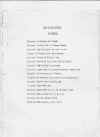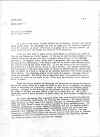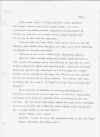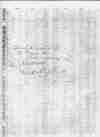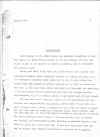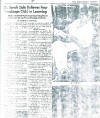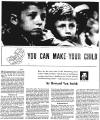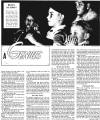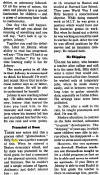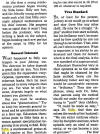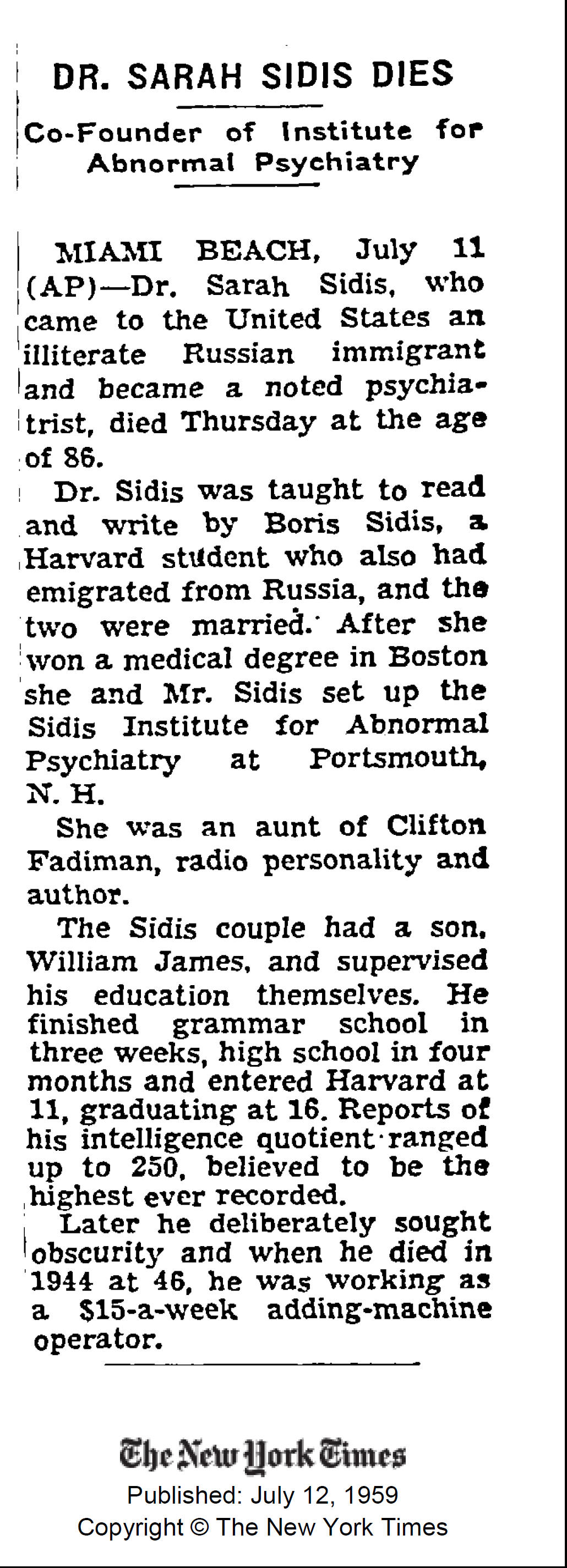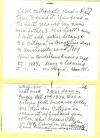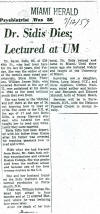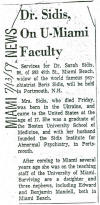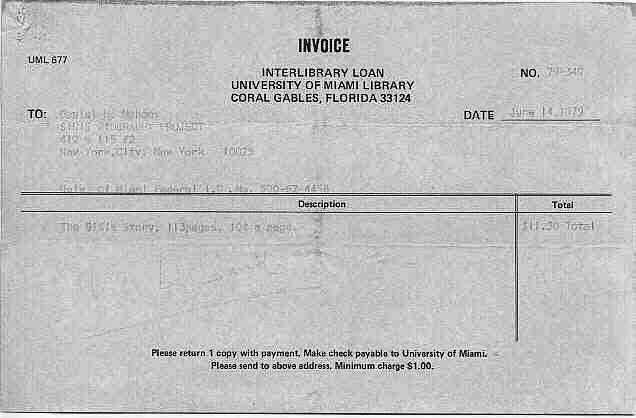| W. J. Sidis
Archives
Boris Sidis Archives
Click images to open.
See also: MY DAY Mrs. FDR Talks To Miami Women By ELEANOR ROOSEVELT HYDE PARK, Wednesday—A few nights ago I read a pamphlet by Harold Taylor, president of Sarah Lawrence College, entitled, "Philosophy As Process." It is, I gather, a reprint of the speech he delivered at Teachers College last winter. One passage seems to me a very wise one to bring to the attention of any teachers. It reads: "There are as many roads to the attainment of wisdom as there are people who undertake to walk them. There are as many solid truths as there are people who can search them out and stand on them firmly. There are as many ideas and ideals as there are men of good will, who will hold them in their minds and act them in their lives. There are as many philosophers as there are men who will give themselves up to the joy and rigor and continuous thought about man's existence." Perhaps the most important study for us all today is the study of man himself. We know so little about him, what makes him do certain things as a mass group, and what motivates the individuals whom we know best around us. I was talking the other day to Dr. Sarah Sidis, of Miami, the widow of a brilliant man and the mother of brilliant children. When I know more about it, I will tell you something of a plan she told me about. This plan is to materialize, I believe, at Miami University. A most interesting observation I got out of my conversation with her is the fact that she believes it is not only brilliant children like hers who can learn to acquire knowledge quickly. Intelligent parents can have intelligent children by learning how to teach them to reason. Parents should encourage them along the lines that are interesting to them and let them find out there is nothing in the world that does not hold interest for them. I am afraid most of us, as parents, do not understand how to accomplish that extraordinary thing that Dr. Sidis was telling me about. But if we can learn it, it is certainly well worth trying. It might mean that a great many of our difficulties with children would be solved. It might also mean that we could come to understand and make life pleasanter for our children at a very much younger age. In any case, I wish we could take more seriously the work of such men in our medical profession as are now prepared to work on mental health and try to use it not only in the individual field, but in the international field. I do not see how we can hope, through any panaceas, to attain peace. It can come only by slow and persistent work within the United Nations for better understanding on every level. For that reason we should be willing to get help from such men as are successfully studying the mental processes of man today. __________ See http://www.gwu.edu/~erpapers/myday/browsebyyear.cfm for an online archive of "My Day" columns.
DR. SARAH SIDIS BELIEVES
FEAR HANDICAPS CHILD IN LEARNING Fear is a great handicap in the learning processes of a young child, and discipline or punishment creates subconscious fears that affect adult life. This belief is the foundation of a theory of education held by Dr. Sarah Sidis of Miami, Fla., which conflicts at several important points with present educational methods in the schools. Dr. Sidis, widow of Dr. Boris Sidis, an outstanding abnormal psychologist at Harvard some decades ago, talked about her theories yesterday while visiting with Mrs. Samuel Starr of 206 Waterman Street. She practiced psychiatry herself for some 40 years and is now 78 years old. But she does not allow age to slow her down. She is writing two books, one for parents and teachers on the Sidis method, which is simple but takes patience and elimination of preconceptions, and another about her own family. Opposes "Disciplining" "If we avoid fear, the mind develops much better," she said. Consequently she does not believe in "disciplining," but in reason and logic. Kindness too. She believes strongly that children are much brighter than adults suppose, although in the earliest years their span of attention may be quite short. Consequently she believes that children will respond to reason. "If you say ‘Don’t’ to a child without explaining why he may be wrong, then you’ve set up a block that will be hard to overcome," she said. People who live in fears of greater or lesser degree lose their capacity for enjoying life, and with it the capacity to learn. "If you have no fears, then you are willing to try any new subject., and you can make faster progress," she said. The earliest years are the most important in helping a child to learn about the world around him; after that "he will take care of himself," she said. Simple Principles Her principles are simple: Besides avoiding punishment, always strive to keep a child's curiosity active. Always answer his questions. Never force a child to learn something he doesn't enjoy or isn't interested in. Forcing learning slows the brain down. "It's the same as being forced to eat a steak after you’ve just had a full course dinner," she explained by way of analogy. Her own childhood, she said taught her the validity of' these working principles. She and her sister as youngsters practically brought up their numerous younger brothers and sisters. That was when she was living in Russia, her native land. “When I was kind to them, they would do the right things. When I yelled at them, they would do the wrong things,” she said. Friends of James She and her husband were great friends of William James, pioneer psychologist. She remembers him as one of the kindest men she ever knew, and a man who was always interested primarily in your ideas, not his own. James was universally liked and admired for those reasons, she believes; and it was those qualities that made him the outstanding student of human nature that he was. The Sidis method stresses an early start; it is harder to achieve success from it when children are older and “conditioned” against the proper way of learning. But Dr. Sidis believes that learning will come much faster. In fact, she believes that 80 per cent of the children brought up in the method would find it possible to complete high school by 12 or even earlier. The important thing for young parents is kindness and a willingness to infuse a desire in their young children to ask questions, she said. For the basis of learning is curiosity, and Dr. Sidis is convinced that modern schools frequently stultify that human attribute.
You Can Make Your Child A Genius by Howard Van Smith
This Week, March 2, 1952.
This Week Tap / click to open, again to enlarge.
___________ See also: Sidis, Boris: Lecture on the Abuse of the Fear Instinct in Early Education.
More About Boris: Excerpts from The Sidis Story, Chapter III
Letter from Dr. Sarah Sidis to Prof. George Herbert Palmer―1923 "In fact we have some partially completed manuscripts on the subjects which we hope sometime to publish."
Letter
from Dr. Herbert Kalmus to Dr. Sarah Sidis―1950
Page from "The Sidis Story" manuscript:
Dr. Sarah M. Sidis [Fragment re Boris and Sarah Birth Dates]
Obituaries:
No. 79-340
|
